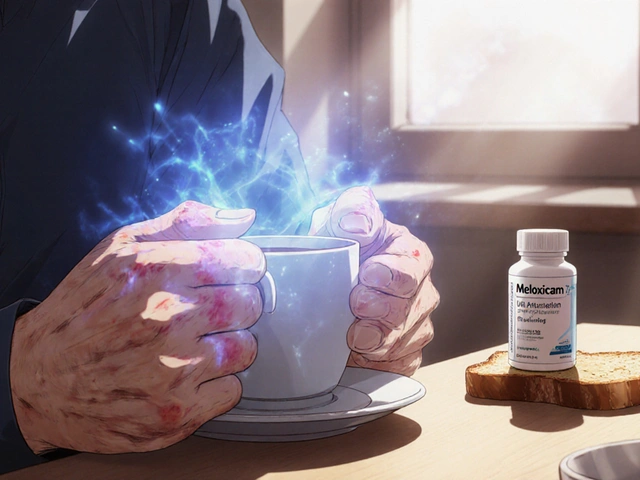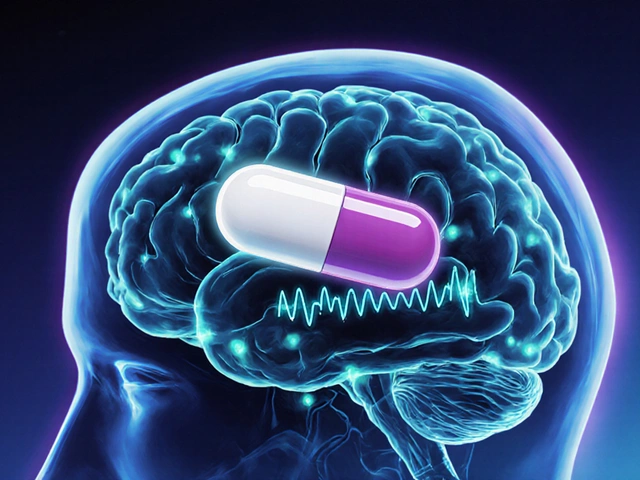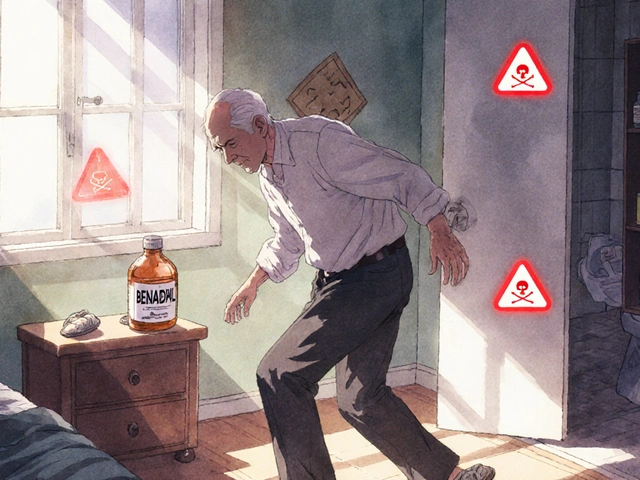Imagine trying to remember where you put your keys, but instead of now and then, it happens every day—and it gets worse. That's what dementia does. Now, meet Exelon. If you know anyone living with Alzheimer's or Parkinson's, chances are you've heard this name tossed around. Doctors prescribe it for memory loss and thinking troubles, but what's really going on when you take this tiny pill or wear the patch? This article spells it all out—no confusing medical language, no beating around the bush. So, why is Exelon such a talking point for families and caretakers dealing with dementia?
What Is Exelon and Who Uses It?
Exelon is a brand name for rivastigmine, a prescription medication used mostly for treating certain kinds of memory and thinking issues. People with Alzheimer’s and some with Parkinson’s get it when their memory starts fading, conversations get tougher, or following a recipe feels like running a marathon. The idea here is to slow those symptoms—not cure them, but hopefully buy more good days in a tough journey.
This drug belongs to a group called cholinesterase inhibitors. Sounds heavy, but all it means is that it helps build up a certain brain chemical that’s usually in short supply for people with these conditions. Most commonly, it's prescribed as a capsule, liquid, or skin patch. The patch is actually a big deal to lots of patients and families because it's easier to remember than a pill and it’s less likely to cause stomach upset—a frequent complaint with some meds.
Here’s the crucial part: Exelon doesn’t work for every type of memory problem. It’s made for Alzheimer’s disease and Parkinson's-related dementia. So, if someone has memory loss from a stroke or other conditions, this might not be the answer. And timing matters too—it's usually started when symptoms are mild to moderate. That helps set real expectations, which can make life a little easier when you’re standing in unfamiliar territory with a loved one. Family doctors and neurologists are usually the ones making this call, and they’ll look at memory tests, medical history, and daily function before reaching for the prescription pad.
Kids and most young adults won’t be using this drug. In fact, it’s not even officially approved for people below 18, and there’s little evidence it does anything for other types of memory troubles. So, think of it as a tool for a very specific set of issues, not a miracle cure or something everyone with a bit of forgetfulness should try.
How Exelon Works: Science Without the Gibberish
Alright, here’s where things usually get confusing—but let’s make it simple. In healthy brains, a chemical called acetylcholine helps nerves send signals for memory, learning, and thinking. In dementia, especially Alzheimer’s disease, those brain cells that make acetylcholine start dying off. Exelon (remember, the science name is rivastigmine) keeps an enzyme called cholinesterase from breaking down this important chemical. So, more acetylcholine hangs around, making it a little easier for brain cells to communicate and hold onto memories or ideas. It’s kind of like turning up the volume on a weak radio station—you might not get perfect audio, but you can catch more of the message.
Studies show that for some people, Exelon makes remembering names or recent conversations a bit easier. It won’t reverse dementia. But for about 30–40% of people who try it, things stabilize for a while—sometimes for several months or even longer. That sound like a small number? Welcome to the reality of brain medicine. There isn’t a home run solution, but Exelon does deliver a base hit for some.
But what about ways to help Exelon do its thing? Here are a few tips:
- Use a pillbox or medication tracker app to make sure doses aren’t missed, even for the patch.
- If you’re a caregiver, watch out for major appetite or weight changes, which can make the medicine act differently.
- Know that the patch can sometimes cause skin irritation—move it to a new, clean area of skin each day.
- Don’t stop or start this medicine suddenly—check with the doctor first, since side effects can pop up if you’re not careful.
And if you really like hard numbers, check out this table for a quick comparison of typical results from research trials.
| Benefit | Approximate Percentage of Users |
|---|---|
| Noticeable memory improvement or stabilization | 30%–40% |
| No clear memory change | 50%–60% |
| Stopped due to side effects | Up to 10% |
Is Exelon perfect? No. But it’s one of the few FDA-approved treatments for these symptoms. If it works, it might mean a son hearing his mom tell a favorite family story one more time—or a dad finding his way home after a walk. That’s not a small thing.

Potential Risks and Side Effects: Straight Talk
No pill comes without a price. The list of side effects for Exelon can get pretty long, but let’s break down the stuff people actually run into and what to do about it. Top of the list: nausea, vomiting, and loss of appetite. If you’re a caregiver, you’ll notice folks picking at their food or losing weight—and that’s your sign to call the doctor. The patch offers a way around some of that, but it can cause skin redness or itching, especially if it’s not moved to a fresh spot each time.
More rarely, some folks get dizzy or confused, and there’s a chance of increased sweating. If you start seeing someone sleepwalking, getting very agitated, or falling more than before, don’t wait—get help. You’ll want to pay extra attention to the elderly, since falls are a big danger. And always, always check with a doctor if there’s a new or worsening heart condition because this medicine can slow the heartbeat in some cases.
The golden rule: don’t double up if you forgot a dose, and don’t just stop cold turkey without letting the healthcare team know. Sometimes stopping abruptly can make memory changes snap back harder. And, the higher the dose, the more chance for side effects. If your loved one is super sensitive, a good move is to start with a low dose and slowly build up—the doctor will usually suggest this anyway.
Sometimes the medicine just doesn’t sit right, and that’s no one’s fault. If Exelon clearly isn’t helping after several months, or the side effects are too much, no shame in moving on. There are a couple other options in the same drug family, like donepezil or galantamine, and it may take some experimenting to find the right fit.
For anyone who’s also taking lots of other meds (especially anticholinergics like Benadryl), let your provider know. Mixing certain drugs can cause extra confusion or slow the gut way down, which is not a small hassle for someone already struggling day-to-day.
Real-Life Tips: Making Exelon Safer and More Helpful
Those little tasks—opening a pill bottle, remembering the date, knowing what time you had breakfast—can feel like climbing a mountain for people on Exelon. So, the practical stuff matters. If you’re the patient or a loved one, here’s what actually makes life easier:
- Stick to a routine. Meds at the same time every day make slip-ups way less likely.
- If the patch causes skin irritation, use a bit of moisturizer, but let the skin dry first so it sticks.
- Write down changes—good or bad—so you can talk them over with the doctor every visit. Don’t just rely on memory.
- Pair this medicine with healthy habits. Walking, simple puzzles, and eating a Mediterranean diet (think fish, nuts, and veggies) all seem to keep the brain humming longer.
- Don't go it alone. Join a support group—in the real world or online. Hearing how others use Exelon, from tricks with sticky notes to new recipes to boost appetite, is a game-changer for both patients and caregivers.
- Set up medication reminders on smartphones or smartwatches. Even a basic kitchen timer taped to the fridge works for some people.
Be ready for days when things just don’t go as planned. There will be mornings when the patch falls off in the shower or a dose is missed. Give yourself grace and focus on the big picture—staying as safe and independent as possible.
For those wondering if it’s worth taking Exelon, the honest answer is this: If it buys you a couple more good conversations or lets a parent spend more time recognizing familiar faces, it often feels worth it. Just keep regular check-ins with your health team, keep an eye out for side effects, and don’t expect miracles from any medicine. But know that little improvements, when it comes to memory, can mean the world.







Khamaile Shakeer
June 16, 2025 AT 04:03Sean Goss
June 17, 2025 AT 12:09Bob Stewart
June 19, 2025 AT 05:44ka modesto
June 20, 2025 AT 07:08Holly Lowe
June 21, 2025 AT 22:56Simran Mishra
June 23, 2025 AT 00:25dayana rincon
June 24, 2025 AT 02:17John Kang
June 24, 2025 AT 05:39Sondra Johnson
June 25, 2025 AT 01:43Chelsey Gonzales
June 26, 2025 AT 12:01Cindy Burgess
June 26, 2025 AT 23:26Tressie Mitchell
June 28, 2025 AT 09:17Orion Rentals
June 29, 2025 AT 17:25MaKayla Ryan
July 1, 2025 AT 04:22Suryakant Godale
July 1, 2025 AT 10:35